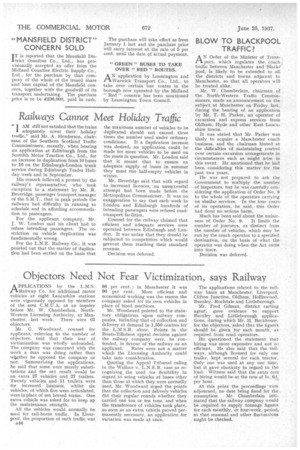Objectors Need Not Fear Victimization, says Railway
Page 58

If you've noticed an error in this article please click here to report it so we can fix it.
APPLICATIONS • by the L.M.S. rkRailway Co. for additional motor vehicles at eight Lancashire stations were vigorously opposed by members of the area C.M.U.A. at an inquiry before Mr. W. Chamberlain, NorthWestern Licensing Authority, at Manchester, last week. There were 62 objectors.
Mr. G. Woodward, counsel for applicant, referring -to the number of objectors, said that their fear of victimization was wholly unfounded. The company was concerned with the work a man was doing rather than wlitether he oppOsed the company or not. Summarizing the applications, he said that some were merely substitutions and the net result would be an extra 27 vehicles and 27 trailers. Twenty vehicles and 11 trailers were for increased business, whilst six vehicles, of which five were articulated, were in place of ten horsed teams. One extra vehicle was asked for to keep up the maintenance strength.
All the vehicles would normally be used for rail-borne traffic. In Liverpool, the proportion of such traffic was B44 98 per cent. ; in Manchester it was 96 per cent,. More efficient and economical working was the reason the company asked for its own vehicles in place of hired machines.
Mr. Woodward pointed to the statutory obligations upon railway companies, including that of collection and delivery at demand in 1,550 centres for the L.M.S.R. alone. Points in the Bouts-Tillotson appeal decision against the railway company were, he contended, in favour of the railway as an applicant. Rates were not a matter which the Licensing Authority mild take into consideration.
Quoting the Appeal Tribunal ruling in the Wallace v. L.N.E.R. case as recognizing. the need for flexibility in regard to using vehicles at bases other than those at which they were normally used, Mr. Woodward urged the points that the collection and delivery vehicles did their regular rounds whether they carried one ton or ten tons, and when the transference of vehicles took place, so soon as an extra vehicle proved permanently necessary, an apPlication for variation was made at once.
The applications related to the railway bases at Manchester, Liverpool, Cliften Junction, Oldham, Hollinwood, Burnley, Rochdale and Littleborough.
Mr. Fred Gilman, district carting agent, gave evidence to support Burnley and Littleborough applications, during which Mr. H. Backhouse, for the objectors, asked that the figures should be given for each month, as required from road operators.
He questioned the statement that hiring was more expensive and not so efficient. He also said that the railways, although licensed for only one • trailer, kept several for each tractor. Only one was used at any one time, but it gave elasticity in regard to the load. Witness said that the extra cost of hiring would be at the rate of is.. 6d. per hour.
At this point the proceedings were adjourned, no date being fixed for the. resumption. Mr. Chamberlain intimated that the railway company would be required to supply tonnage figures for each monthly, or four-week, period, so that seasonal and other fluctuations might be checked.




























































































